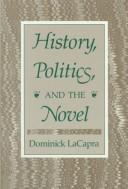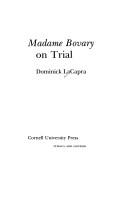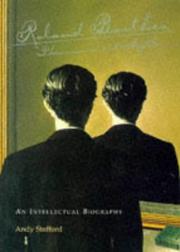| Listing 1 - 10 of 56 | << page >> |
Sort by
|
Book
ISBN: 0691014035 1306993644 0691613451 0691641242 1400856914 9781400856916 9780691014036 9780691613451 Year: 1983 Publisher: Princeton (N.J.) Princeton University Press
Abstract | Keywords | Export | Availability | Bookmark
 Loading...
Loading...Choose an application
- Reference Manager
- EndNote
- RefWorks (Direct export to RefWorks)
In this compact volume readers just beginning Proust's master work and those who are already enriched by it will become aware of a significance not unkown but only forgotten"--the basic structure of Proust's enormous novel. The overall meaning of Proust's book lies in his three ways of looking at the world--cinematographic, montage, and stereoscopic--and their varying effects on the emotions and the intellect.Originally published in 1983.The Princeton Legacy Library uses the latest print-on-demand technology to again make available previously out-of-print books from the distinguished backlist of Princeton University Press. These editions preserve the original texts of these important books while presenting them in durable paperback and hardcover editions. The goal of the Princeton Legacy Library is to vastly increase access to the rich scholarly heritage found in the thousands of books published by Princeton University Press since its founding in 1905.

ISBN: 0801494486 1501705210 Year: 1987 Publisher: Ithaca (N.Y.): Cornell university press
Abstract | Keywords | Export | Availability | Bookmark
 Loading...
Loading...Choose an application
- Reference Manager
- EndNote
- RefWorks (Direct export to RefWorks)
Perhaps the leading Western intellectual of his time, Jean-Paul Sartre has written highly influential works in a diverse number of subject areas: philosophy, literature, biography, autobiography, and the theory of history. The concise and lucidly-written A Preface to Sartre discusses the French philosopher's contributions in all of these fields. Making imaginative use of the insights of some of the most important contemporary French thinkers (notably Jacques Derrida), Dominick LaCapra seeks to bring about an active confrontation between Sartre and his critics in terms that transcend the opposition between existentialism and structuralism. Referring wherever appropriate to important events in Sartre's life, he illuminates such difficult works as Being and Nothingness and the Critique of Dialectical Reason, and places Sartre in relation to the traditions that he has explicitly rejected. LaCapra also offers close and sensitive interpretations of Nausea, of the autobiography, The Words, and of Sartre's biographical studies of Baudelaire, Genet, and Flaubert. "I envision intellectual history," writes laCapra, "as a critical, informed, and stimulating conversation with the past through the medium of the texts of major thinkers. Who else in our recent past is a more fascinating interlocutor than Sartre?"

ISBN: 0801414776 9781501720017 1501720015 9780801414770 9781501727986 Year: 2018 Publisher: Cornell University Press
Abstract | Keywords | Export | Availability | Bookmark
 Loading...
Loading...Choose an application
- Reference Manager
- EndNote
- RefWorks (Direct export to RefWorks)
In 1857, following the publication of Madame Bovary, Flaubert was charged with having committed an "outrage to public morality and religion." Dominick LaCapra, an intellectual historian with wide-ranging literary interests, here examines this remarkable trial. LaCapra draws on material from Flaubert's correspondence, the work of literary critics, and Jean-Paul Sartre's analysis of Flaubert. LaCapra maintains that Madame Bovary is at the intersection of the traditional and the modern novel, simultaneously invoking conventional expectations and subverting them.
Flaubert, Gustave --- Flaubert, Gustave, --- LITERARY CRITICISM / European / French.
Book
ISBN: 0812273842 1512804754 Year: 1963 Publisher: Philadelphia, Pa
Abstract | Keywords | Export | Availability | Bookmark
 Loading...
Loading...Choose an application
- Reference Manager
- EndNote
- RefWorks (Direct export to RefWorks)
Corneille: His Heroes and Their Worlds will appeal to all those with an interest in French Drama as well as those studying the application of modern critical techniques to classical authors. Students of theory of tragedy will also find this new look at Corneillian "tragedy" stimulating.
Corneille, Pierre --- LITERARY CRITICISM / European / French. --- Corneille, Pierre, --- Characters --- Heros.
Book
ISBN: 1400869188 9781400869183 9780691619125 9780691062396 0691062390 0691619123 Year: 1973 Publisher: Princeton, New Jersey
Abstract | Keywords | Export | Availability | Bookmark
 Loading...
Loading...Choose an application
- Reference Manager
- EndNote
- RefWorks (Direct export to RefWorks)
Since his death in October 1970, Jean Giono's reputation as a major French novelist has steadily increased. In order to treat most powerfully the essential nature of modern man confronted with the worst problems of the twentieth century, he adapted into prose the tried and true literary modes: the epic, the pastoral, Greek tragedy, Shakespearean tragedy, and autobiography. In Giono's work the old modes and familiar forms continue to fulfill the age-old functions of great literature: we see the Christian epic suddenly made relevant to everyday life or the pagan epic re-explain modern male savagery. In Giono's hands the novel explains man to himself, shows man more clearly the world about him, and offers to men everywhere renewed courage and hope.Originally published in 1973.The Princeton Legacy Library uses the latest print-on-demand technology to again make available previously out-of-print books from the distinguished backlist of Princeton University Press. These editions preserve the original texts of these important books while presenting them in durable paperback and hardcover editions. The goal of the Princeton Legacy Library is to vastly increase access to the rich scholarly heritage found in the thousands of books published by Princeton University Press since its founding in 1905.

ISBN: 0585123330 9780585123332 0748608672 9780748608676 Year: 1998 Publisher: Edinburgh Edinburgh University Press
Abstract | Keywords | Export | Availability | Bookmark
 Loading...
Loading...Choose an application
- Reference Manager
- EndNote
- RefWorks (Direct export to RefWorks)
Following the recent publication of Roland Barthes's Complete Works in French, this book explores the development of ideas across his career. Aware of the pitfalls of a biographical approach to the 'Death of the Author' theorist, Andy Stafford attempts to find Barthes somewhere between the writer as both product and producer of his time, by looking at influences on, and the reception of, his work. Barthes's life is divided into three distinct phases: the polemical journalist prior to 1960; the academic theorist in the 60s; and the celebrated intellectual of the 1970s.
Critics --- Critiques --- LITERARY CRITICISM / European / French. --- Biography --- France. --- Biographies
Book
ISBN: 9783111128306 311112830X 3111125556 Year: 2023 Publisher: Berlin/Boston : Walter de Gruyter GmbH,
Abstract | Keywords | Export | Availability | Bookmark
 Loading...
Loading...Choose an application
- Reference Manager
- EndNote
- RefWorks (Direct export to RefWorks)
How can universality be addressed after the necessary epistemic and ethical critique of Western universalism? Building on such concepts as materiality and reparation, narration and translation, the series Beyond Universalism | Partager l'universel seeks to understand how contemporary cultural and social practices are producing a new consciousness of universality - experiences, reflections, and agencies of a shared humanity.
LITERARY CRITICISM / European / French. --- Francophonie. --- contemporary literature. --- universalism. --- universality.
Book
Year: 2016 Publisher: [s.l.] : Fundação Editora da UNESP,
Abstract | Keywords | Export | Availability | Bookmark
 Loading...
Loading...Choose an application
- Reference Manager
- EndNote
- RefWorks (Direct export to RefWorks)
Rastro, hesitação e memória pretende investigar as relações entre poesia e tempo. Há nos poemas de Anti-Platon e Du Mouvement et de l'immobilité de Douve, tanto quanto nos ensaios de L'Improbable, a condenação de um inteligível abstrato em virtude do esquecimento do tempo. A poesia repercutiria uma tensão entre interioridade conceitual e exterioridade. As palavras do poema evocariam um apagamento: rastro, presença ausente. A perda se tornaria a origem da linguagem poética.
LITERARY CRITICISM --- Literary Criticism / European / French --- Literature --- History and criticism
Book
Year: 2016 Publisher: [s.l.] : Fundação Editora da UNESP,
Abstract | Keywords | Export | Availability | Bookmark
 Loading...
Loading...Choose an application
- Reference Manager
- EndNote
- RefWorks (Direct export to RefWorks)
Rastro, hesitação e memória pretende investigar as relações entre poesia e tempo. Há nos poemas de Anti-Platon e Du Mouvement et de l'immobilité de Douve, tanto quanto nos ensaios de L'Improbable, a condenação de um inteligível abstrato em virtude do esquecimento do tempo. A poesia repercutiria uma tensão entre interioridade conceitual e exterioridade. As palavras do poema evocariam um apagamento: rastro, presença ausente. A perda se tornaria a origem da linguagem poética.
LITERARY CRITICISM --- Literary Criticism / European / French --- Literature --- History and criticism
Book
ISBN: 9783111428000 3111428001 3111427889 Year: 2024 Publisher: Berlin/Boston : Walter de Gruyter GmbH,
Abstract | Keywords | Export | Availability | Bookmark
 Loading...
Loading...Choose an application
- Reference Manager
- EndNote
- RefWorks (Direct export to RefWorks)
Talk of repair has become ubiquitous in recent years. In the age of trauma culture, art and literature have a new purpose: to do justice, to console, comfort, and heal. Drawing on works of twenty-first-century French-language literature, this monograph shows how literature can not only serve as a means of "personal development", but expand our capacity for empathy, help repair the "brokenness" implied in victimhood, and redress individual and collective traumas. Centered on a critical reflection on discourses of repair (and reparations), it questions the canonical theories on the functions of literature and proposes a new way of writing (and reading) literary history. Praise "Repair the World is an invigorating and essential call to arms. The modern category of the literary, it declares, is being outpaced by the contemporary uses of literature: as a medium of exorcism, empathy, reparation, testimony, commemoration, existential renewal, and ethical or political connectivity. Neither celebrating nor condemning such uses, Gefen models a much-needed style of criticism - interdisciplinary, pragmatic, relational - that comes to grips with their importance." - Rita Felski, the John Stewart Bryan Professor and Professor of English at the University of Virginia (USA) "In an era where self-help, memoir, and autobiography command more than their fair share of publisher's lists in France, it's tempting, some fifty years after post-structuralism's heyday, to ascribe an impending 'death of literature' to a taste for narcissistic exhibitionism in French literary culture. But why bemoan the waning relevance of the question 'what is literature?,' asks Alexandre Gefen, when evidence abounds in the new century that literary writing increasingly posits itself as a restorative, reparative act? In the best instances, authors who give form to embodied experience imaginatively forge with their readers empathetic bonds of the sort that secular and religious institutions long sustained. Repair the World is not only a capacious study of writers who hail from surprisingly broad sectors of French society, from health and social workers to skilled laborers, journalists, and educators; it's a situated call for a pragmatics of reading that makes of each book an intervention into the fabric of the real. Harnessing sources in affect theory, trauma studies, ethics, and cognitive science, Alexandre Gefen performs a critically reparative act all his own, reminding us that the notion of literature as autonomous object was itself a historical construct, in short: an ideology. Reading and writing have always conjoined care for the self and care for others, and it's upon that reciprocity that the communities of sense of tomorrow can flourish in a spirit of reparative humanism". - Derek Schilling, Professor of French, Director of the Centre Louis Marin, Department of Modern Languages and Literatures, Johns Hopkins University (USA) "Alexandre Gefen's wide-ranging, thought-provoking study takes stock of a paradigm shift in contemporary French literature, away from a model of autonomy and intransitivity to ways of writing and reading that seek to repair, restore, reassure, and rebuild. From the varied forms of expressivity found in self-narratives to the empathetic projections of fiction, Repair the World maps out an expanding literary territory that seeks not critical negativity but rather the power to intervene for good in individual and collective life. While reserving judgment on the actual extent of literature's effects, Gefen demonstrates that contemporary projects and discourses undeniably center the therapeutic and remediative uses of literature. With its nuanced readings and keen insights, Repair the World has been rightly influential in France; its powerful diagnosis of contemporary sensibilities resonates far beyond, revealing both
LITERARY CRITICISM / European / French. --- 21st century. --- French literature. --- aesthetics. --- care.
| Listing 1 - 10 of 56 | << page >> |
Sort by
|

 Search
Search Feedback
Feedback About UniCat
About UniCat  Help
Help News
News